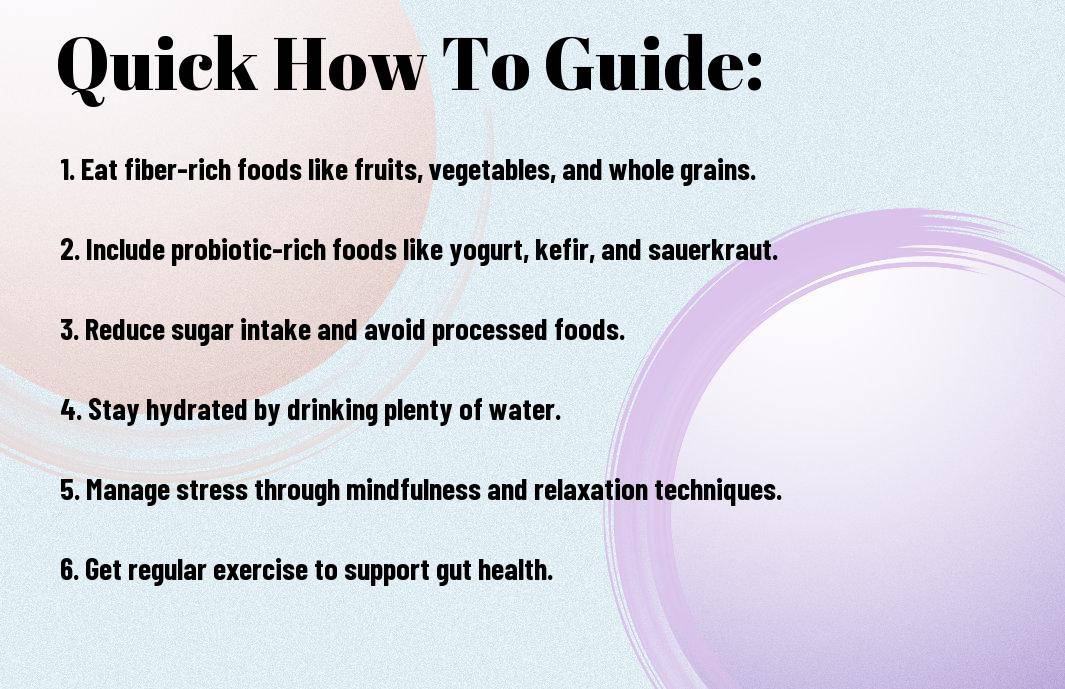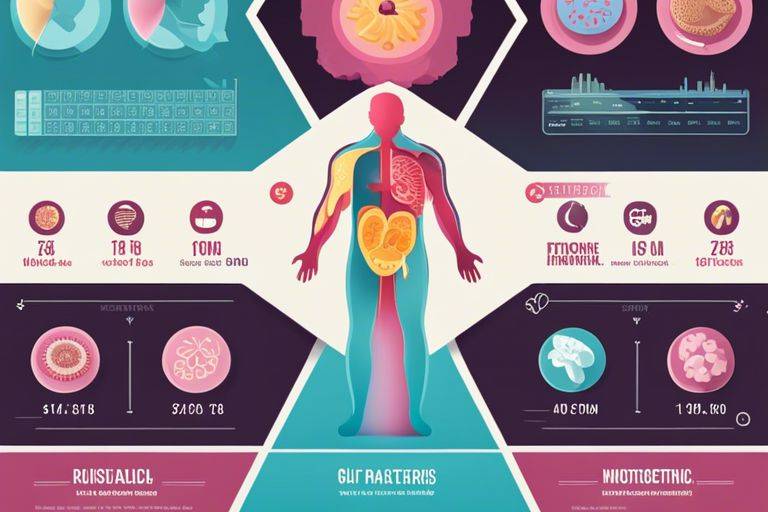Gut Health is crucial for overall well-being. In just 30 days, you can transform your digestive system by making simple yet powerful changes to your diet and lifestyle. By incorporating a variety of 30 different plants per week, you can enhance your gut microbiome and improve your immune system. Follow these steps, and you’ll notice a difference in your energy levels, mood, and overall health in no time.
Key Takeaways:
- Diversify your diet: Eat a wide range of fruits, vegetables, whole grains, legumes, nuts, and seeds to promote a diverse gut microbiome.
- Include probiotic-rich foods: Incorporate foods like yogurt, kefir, sauerkraut, and kimchi to introduce beneficial bacteria to your gut.
- Reduce processed foods: Minimize your intake of processed foods and added sugars that can negatively impact gut health.
- Manage stress: Implement stress-reducing techniques such as meditation, yoga, and deep breathing to support a healthy gut-brain connection.
- Stay hydrated: Drink plenty of water throughout the day to maintain optimal digestion and support a healthy gut.
- Get enough sleep: Aim for 7-9 hours of quality sleep each night to promote a balanced gut microbiome.
- Consult a healthcare professional: If you have digestive issues or concerns about your gut health, seek guidance from a healthcare provider or registered dietitian.


Understanding the Importance of Gut Health
The Role of Gut Bacteria in Overall Health
Even though you may not be aware of it, your gut is home to trillions of bacteria that play a crucial role in your overall health. These bacteria help with digestion, nutrient absorption, and even support your immune system. Maintaining a healthy balance of gut bacteria is vital for your well-being.
Common Signs of an Unhealthy Gut
Understanding the common signs of an unhealthy gut is vital for recognizing when your digestive system needs support. Symptoms like bloating, gas, constipation, diarrhea, and frequent stomach upset can indicate an imbalance in your gut flora. Additionally, skin irritation, fatigue, and even mood swings can be linked to poor gut health.
The Consequences of Ignoring Gut Health
Importance of ignoring gut health can have serious consequences for your overall health. If you neglect your gut, you may experience chronic digestive issues, weakened immunity, inflammation, and nutrient deficiencies. Over time, these problems can lead to more severe conditions like irritable bowel syndrome, autoimmune diseases, and mental health disorders.

Preparing for a Healthy Gut
Setting Realistic Expectations for the 30-Day Challenge
There’s no quick fix when it comes to improving your gut health. It’s important to set realistic expectations and understand that significant changes take time. While you may start to feel better within the 30 days, long-lasting gut health improvements are a journey that requires consistency and dedication.
Tips for Creating a Gut-Friendly Environment
Expectations for a gut-friendly environment include reducing stress levels through practices like yoga or meditation, getting regular exercise, and creating a balanced diet rich in fiber and fermented foods. These changes can support the growth of beneficial gut bacteria and improve overall digestive health.
- Manage stress levels
- Stay active with regular exercise
- Incorporate fiber and fermented foods into your diet
Any of these lifestyle changes can contribute to a healthier gut environment and improve your overall well-being.
Essential Tools and Resources for Success
Tips for success on this 30-day journey include keeping a food journal to track your diet, setting reminders for taking probiotics or supplements, and finding support through online communities or with a healthcare provider. These resources can help you stay on track and make the most of your gut health challenge.
- Keep a food journal to monitor your diet
- Set reminders for probiotics or supplements
- Seek support from online communities or healthcare providers
Understanding and utilizing these vital tools can enhance your gut health journey and set you up for success in cultivating a healthier digestive system.
Dietary Factors for a Healthy Gut
Not all foods are created equal when it comes to promoting a healthy gut. Incorporating fiber-rich foods, probiotics, and prebiotics into your diet is key for maintaining a balanced gut microbiome. These components help nourish the beneficial bacteria in your gut and promote good digestion.
Foods to Include in Your Diet for Optimal Gut Health
To cultivate a healthy gut, make sure to include a variety of fiber-rich foods like fruits, vegetables, whole grains, and legumes in your daily meals. Additionally, incorporating probiotic-rich foods such as yogurt, kefir, sauerkraut, and kombucha can help support a diverse gut microbiota.
Foods to Avoid or Limit for Gut Health
One key factor in maintaining gut health is to limit your intake of processed foods, sugary beverages, artificial sweeteners, and saturated fats. These foods can negatively impact your gut bacteria and lead to digestive issues.
Foods high in added sugars and artificial additives can disrupt the balance of your gut microbiome, leading to imbalances and potential inflammation in the gut lining. Avoiding these foods can help maintain a healthy gut environment and support overall well-being.
Meal Planning Strategies for a Balanced Gut
Little adjustments in your meal planning can make a big difference in supporting a healthy gut. Focus on incorporating a variety of whole foods, lean proteins, healthy fats, and colorful fruits and vegetables in your meals to promote optimal gut health.
The timing of your meals can also impact your gut health. Aim for regular meal times and avoid heavy meals right before bed to give your digestive system a break and promote better gut function.

Lifestyle Factors for a Healthy Gut
Many lifestyle factors can influence the health of your gut. Proper nutrition, regular exercise, adequate sleep, and effective stress management all play a role in maintaining a healthy gut microbiome. Knowing how these factors impact your gut health can help you make positive changes to support your overall well-being.
The Impact of Stress on Gut Health
Impact: Stress can have a significant impact on your gut health as it can disrupt the balance of bacteria in your digestive system, leading to issues such as inflammation and digestive discomfort. Managing stress is crucial for promoting a healthy gut microbiome.
How Sleep and Exercise Affect Gut Bacteria
For: Sleep and exercise are crucial for maintaining a diverse and healthy gut microbiota. Getting an adequate amount of sleep and engaging in regular physical activity can help promote the growth of beneficial bacteria in your gut, contributing to improved digestion and overall health.
The quality and duration of your sleep, as well as the intensity and consistency of your exercise routine, can all impact the composition of your gut microbiome. Strive to prioritize both sleep and exercise in your daily routine to support a healthy gut.
Managing Stress and Promoting Relaxation
If: If left unchecked, chronic stress can have detrimental effects on your gut health. Implementing stress management techniques such as meditation, yoga, or deep breathing exercises can help reduce stress levels and promote relaxation, benefiting both your mental well-being and gut health.
Managing stress is crucial for maintaining a healthy gut microbiome. By incorporating relaxation practices into your daily routine, you can create a more balanced and harmonious environment for your gut bacteria to thrive.
Supplements and Probiotics for Gut Health
Understanding the Role of Probiotics in Gut Health
Despite my efforts to eat a balanced diet, I realized that sometimes my gut needed extra support. That’s where probiotics came in. Probiotics are live bacteria and yeasts that are good for your digestive system. They help maintain the natural balance of organisms in your intestines and can provide numerous health benefits.
Choosing the Right Probiotic Supplement for You
While browsing through various probiotic supplements, I was overwhelmed by the options available. It’s important to choose a probiotic supplement that contains strains known to benefit digestive health, such as Lactobacillus and Bifidobacterium. Look for supplements with a high CFU (colony-forming units) count for maximum effectiveness.
Another option to consider is a spore-based probiotic, like Bacillus coagulans, which has a protective outer shell that allows it to survive harsh stomach acids and reach the gut intact. This type of probiotic may be more resilient and effective in supporting gut health.
Additional Supplements for Gut Health Support
Choosing the right supplements to support gut health can be beneficial in addition to probiotics. Support your digestive system with supplements like digestive enzymes, which can help break down food more effectively and ease bloating and discomfort. Including fiber supplements, such as psyllium husk or inulin, can also promote healthy digestion and regular bowel movements.
Tips for Overcoming Common Gut Health Challenges
Your gut health journey may come with some challenges along the way. Here are some tips to help you navigate and overcome these obstacles:
- Listen to your body and pay attention to how foods make you feel.
- Stay consistent with your healthy habits to see long-term improvements.
- Manage stress through techniques like yoga or meditation to support your gut health.
- Get enough sleep to allow your body to repair and restore overnight.
Knowing how to tackle these challenges will help you on your journey to better gut health. For a quick reset, you can also check out How to Reset Your Gut in 3 Days.
Managing Digestive Issues and Discomfort
Little changes in your diet and lifestyle, like adding probiotic-rich foods and staying hydrated, can help ease digestive discomfort.
Overcoming Cravings and Staying on Track
There’s no denying that cravings can derail your efforts to improve gut health. Stay on track by incorporating healthy swaps and planning ahead for meals and snacks.
Dealing with Setbacks and Maintaining Motivation
Motivation plays a key role in sustaining a healthy gut. To stay on course, reflect on your progress, reassess your goals, and reach out for support when needed.
To wrap up
Upon reflecting on the 30-day journey to a healthier gut, I hope you’ve gained valuable insights and tools to cultivate a thriving gut ecosystem. Be mindful of, incorporating probiotic-rich foods, fiber, and fermented foods can support your gut health. Be mindful of stress management and prioritizing sleep, as they also play a crucial role in gut function. Small, consistent changes can lead to significant improvements in your overall well-being. Here’s to your continued journey to a healthier gut!
FAQ
Q: What are the benefits of a healthy gut?
A: A healthy gut can boost your immune system, improve digestion, increase energy levels, and even support mental health.
Q: How can I start cultivating a healthy gut in just 30 days?
A: You can start by incorporating more fiber-rich foods, probiotics, and prebiotics into your diet, and reducing stress levels.
Q: What foods should I eat to promote a healthy gut?
A: Foods like yogurt, kefir, sauerkraut, kimchi, and whole grains are great for promoting a healthy gut.
Q: Can exercise help improve gut health?
A: Yes, regular exercise can help improve gut health by promoting a diverse microbiome and reducing inflammation.
Q: How important is hydration for gut health?
A: Staying hydrated is crucial for gut health as it helps maintain the mucosal lining of the intestines and supports digestion.
Q: Are there any supplements that can help improve gut health?
A: Probiotic supplements can help introduce beneficial bacteria to your gut, and fiber supplements can support a healthy microbiome.
Q: What are some signs of an unhealthy gut?
A: Symptoms of an unhealthy gut include bloating, gas, diarrhea, constipation, food intolerances, and frequent infections.



